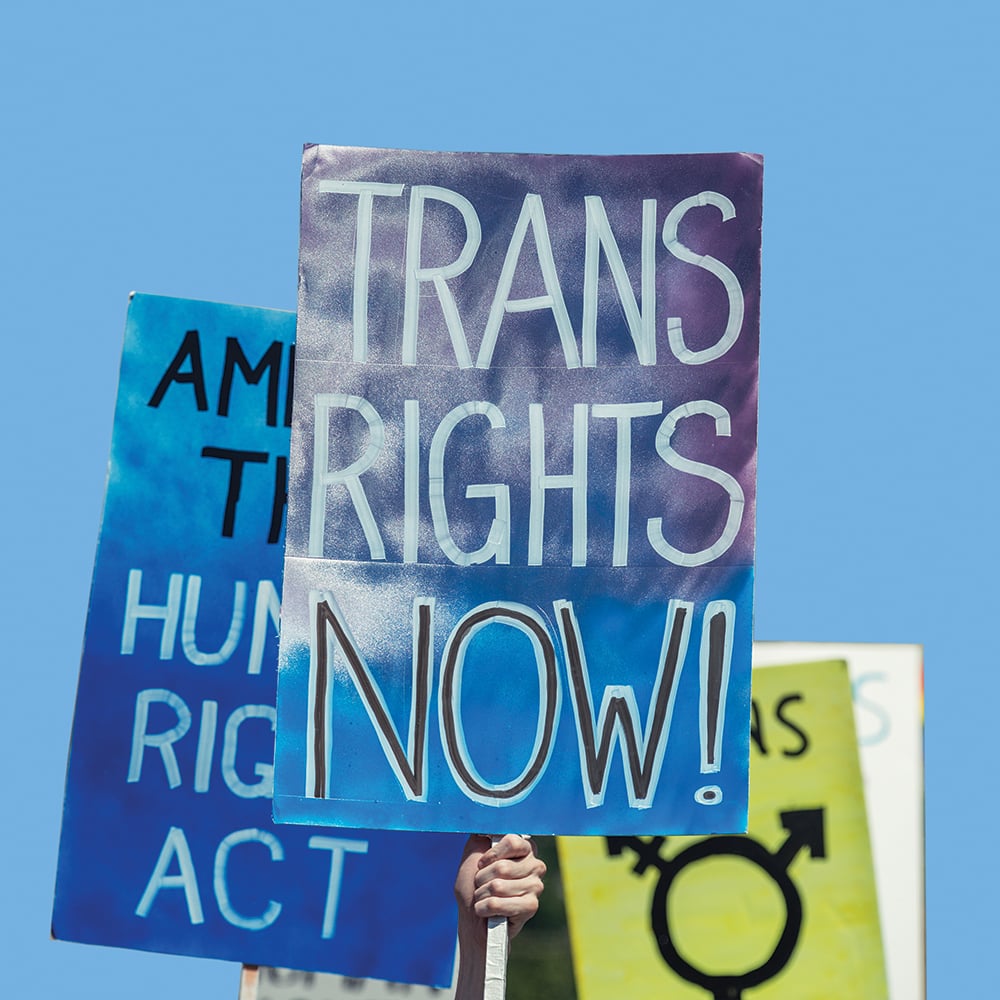
A Safe Space in a Sea of Hate
How DAP Health is elevating lifesaving gender-affirming care in Southern California.
Words by Jacob Anderson-Minshall
As seen in DAP Health Magazine Issue 4
Navigating the Storm: The Landscape of Gender-Affirming Care
A wave of legislation targeting trans and nonbinary people — especially youth — is radically reshaping Americans’ rights in states across the nation. There are new restrictions on access to LGBTQ+ books, public restrooms, and participation in sports. But the greatest threat to trans lives is undoubtedly the recent criminalization of gender-affirming care.
The Battle Against Discrimination: Upholding Gender-Affirming Care
The ACLU is currently tracking 492 anti-LGBTQ+ bills — more than in any previous period in U.S. history — nearly half specifically targeted at transgender, gender-nonconforming, and nonbinary people. In fact, against the advice of the American Medical Association and the American Academy of Pediatrics, at least 90 of those bills will prevent trans youth from accessing age-appropriate, medically necessary, and life-saving health care. (When that happens, suicide rates also rise.)
Just this year, 19 states (Texas being the largest) have restricted some (often all) gender-affirming care for anyone under 18. Despite the propaganda, genital surgeries aren’t and haven’t been offered to trans kids, but these laws can eliminate access to hormone therapy and puberty blockers. Criminalizing gender-affirming care intensifies the already significant barriers trans people face when seeking medical services.
Anthony Velasco, a senior nurse practitioner specialist who led the development of DAP Health’s gender wellness program, explains, “In my research on stigma and primary care access among transgender and gender-diverse people, many reported experiencing violence and victimization when accessing care.”
A Beacon of Hope: DAP Health's Gender Wellness Program
DAP Health aims to turn that tide and improve access to gender-affirming medical care across Southern California.
“Creating safe spaces for all people, regardless of their gender identities” is a natural extension for DAP Health, Velasco says. “We exercise social justice by continuously engaging our communities, interrogating social injustices, and addressing health inequities.”
The same could be said for Velasco, who uses he/they pronouns. He identifies as a “queer person of color, an immigrant, and a first-generation student” who provides care for “systemically and historically minoritized communities.”
Standing Firm: The Fight for Inclusive Healthcare
Now that DAP Health has absorbed the Borrego Health system, it is poised to further elevate lifesaving gender-affirming care with Cathedral City’s LGBTQ+ clinic Stonewall Medical Center. Dr. Jason Halperin will be leading that charge — working out of both Stonewall and DAP Health’s clinic in Escondido — as the incoming director of specialty programs for gender-affirming care as well as those living with, or at risk of, contracting HIV.
Dr. Halperin hails from New Orleans, a blue city in a deeply red state. It’s “an island of inclusion in a sea of oppression,” he says. But even in places that embrace diversity, like much of Southern California, Dr. Halperin maintains, “We must be aware of the national backlash against so many of the communities we serve, especially those of trans experience. [In Louisiana] I witnessed the impact of clinics that provided reproductive health services and gender-affirming care shuttered due to the politics of hate.”
Manager of Gender Health and Wellness Programs Mita Beach has witnessed the chilling effects the anti-trans backlash has had locally. “In all of Southern California, there are two clinics in L.A., one clinic in San Diego, and our clinic in Palm Springs that will see trans youth,” they say, adding that there were two or three more in 2021, but providers are being “scared away” by the criminalization of trans care.
As trans people, families with trans kids, and trans adults flee other states, DAP Health is committed to boosting Stonewall Center’s beacon and serving as a safe haven where care is accessible to everyone.
The nonprofit already has “a proven track record of shifting the norm to a more equitable one,” Velasco says. “As we expand our clinics within and around the Coachella Valley, we continue to be committed to opening our doors even wider so we can provide more services to our trans and gender-diverse patients.”
Breaking Barriers: Overcoming Obstacles to Care
Empowering trans, nonbinary, and other gender-expansive people to walk through DAP Health’s doors is Beach’s job. There are numerous barriers to care that trans and nonbinary folks face, including social determinants of health like lower incomes and lack of transportation.
Just connecting isolated trans and nonbinary folks with each other is difficult in rural areas with a widely dispersed population, says Beach. Another issue is “misinformation in general,” they say. Many don’t know what care is available, or that it is accessible, even for those who need financial assistance.
To overcome those hurdles, Beach has done outreach at every LGBTQ+ event they could find. “I would go and put up posters and signs at coffee shops out in the middle of nowhere, and I would get one or two phone calls,” they say. “But a lot of it is word of mouth.” Beach thinks DAP Health’s track record of “engaging with the community outside of the clinic’s doors” will help spread the word about safe, accessible, and competent gender-affirming care.
The Road Ahead: Expanding Services and Support
Even before the two federally qualified health centers had joined forces, DAP Health’s gender wellness initiative had begun to make inroads.
“We were able to increase the number of actively engaged transgender and gender-diverse patients by more than 400%,” Velasco adds. “Creating an interdisciplinary team and grounding our program using a trauma-informed and patient-centered approach was critical.”
Working with different departments within DAP Health was also crucial in meeting the psychosocial needs of patients, like “housing, social services, access to food, care navigation,” Velasco says. And, with the expansion of DAP Health, “we will be able to offer these services to more trans people.”
Beach is there to connect trans people to appropriate care even before they arrive. They help patients overcome their fears and share relevant details with providers. Making potential clients feel welcome also takes representation. “From the front desk to the provider, somewhere in that chain, we have to have some trans and gender-diverse folks.”
Beach, who is nonbinary and queer, is personally dedicated to that effort, currently studying to become a nurse practitioner “because I don’t see enough people that look like me.”
Of course, providing competent gender-affirming medical care isn’t as easy as hiring a few trans or nonbinary folks. Providers need to understand trans care, and how it differs.
“Trans health care isn’t typical health care,” Beach explains. “Typically, when people go to the clinic, it’s because they’re sick or because they have to go once a year for a checkup.” But trans people often need to see a provider more frequently, especially if they are receiving gender-affirming hormone therapy, which needs to be monitored.
Circumstances can also complicate access to care, especially the dysphoria that can exist in a physical body that doesn’t reflect one’s true gender. For example, Velasco points to one study on cervical cancer screenings. When retesting was necessary, trans men waited nearly 420 days, compared to the 80 days cisgender women wait.
The experience of receiving gynecological care can be a fraught one for many trans men and nonbinary people assigned female at birth, Velasco explains. “Some trans people may find getting a Pap smear dysphoric, and, thus, avoid or delay getting testing and retesting.” Velasco adds, “Finding gender-affirming health care providers…can also be very challenging.”
Culturally competent providers are especially important for youth, but their care is becoming the most criminalized in the U.S. Fortunately, it is still embraced in California. Following international protocols and recommendations from dozens of medical associations, the Stonewall Medical Center and Escondido will continue providing nonsurgical interventions for youth. Teens can be prescribed puberty blockers and/or gender-affirming hormone therapy.
At DAP Health, services provided to trans and nonbinary patients already run the gamut, Velasco says, including primary care, behavioral health, dentistry, sexual wellness, chiropractic, and social services.“We hope to expand our gender-affirming services to include speech therapy (for voice feminization and masculinization), electrolysis/laser hair removal services, and legal clinics (for legal transition needs),” Velasco adds. “We hope to eventually expand our services to include surgical and post-surgical services to our [adult] trans and nonbinary patients.”
Stigma increases against those who find themselves at the intersections of various identities, including gender identity, expression, and sexual orientation. Both Velasco (a credentialed HIV specialist) and Dr. Halperin (the former infectious disease director at New Orleans’ CrescentCare) understand another intersection.
“People of trans experience and nonbinary communities have increased rates of HIV acquisition, especially those of color,” Dr. Halperin says. “We know that racism and stigma play the greatest role in driving these increased rates. Furthermore, when structures of power such as the police — or increasingly, legislatures — target and stigmatize communities, we will inevitably see worsening health outcomes due to exclusion.”
Shining the Light: A Call to Action
That’s why, Dr. Halperin adds, DAP Health “must commit even more to this work. We must shine our light bright and far. Our clinics need to ensure easy and supportive accessibility to gender-affirming care. We must also continue to work in solidarity with those across our country.”









